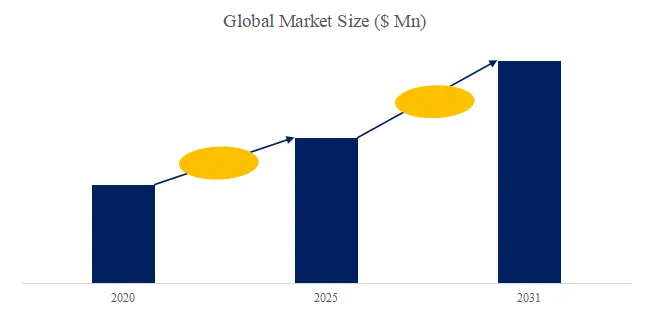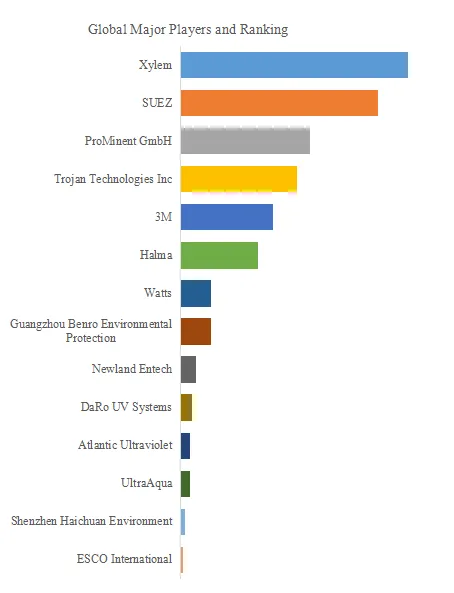UV (Ultraviolet) water treatment systems are technology-based systems that use ultraviolet light to disinfect water by inactivating bacteria, viruses, and other microorganisms present in water. UV water treatment is a chemical-free and environmentally friendly method that effectively eliminates harmful pathogens from water, making it safe for consumption in various applications, including residential, commercial, industrial, and municipal settings.
According to the new market research report “UV Water Treatment Systems- Global Market Share and Ranking, Overall Sales and Demand Forecast 2025-2031”, published by QYResearch, the global UV Water Treatment Systems market size is projected to reach USD 2.26 billion by 2031, at a CAGR of 7.1% during the forecast period.
Figure. Global UV Water Treatment Systems Market Size (US$ Million), 2020-2031

Source: QYResearch, “UV Water Treatment Systems- Global Market Share and Ranking, Overall Sales and Demand Forecast 2025-2031”
Figure. Global UV Water Treatment Systems Top 14 Players Ranking and Market Share (Ranking is based on the revenue of 2024, continually updated)

Source: QYResearch, “UV Water Treatment Systems- Global Market Share and Ranking, Overall Sales and Demand Forecast 2025-2031”
According to QYResearch Top Players Research Center, the global key manufacturers of UV Water Treatment Systems include Xylem, SUEZ, ProMinent GmbH, Trojan Technologies Inc, 3M, etc. In 2024, the global top five players had a share approximately 35.0% in terms of revenue.
In terms of product type, Flow Rates 20-100 GPM is the largest segment, hold a share of 49.7%,
Market Drivers for UV Water Treatment Systems:
Waterborne Disease Prevention: The increasing awareness of waterborne diseases and the importance of safe drinking water drive the demand for UV water treatment systems as an effective and reliable method for disinfecting water and ensuring public health and safety.
Regulatory Compliance: Stringent regulations and standards governing water quality and safety, such as those set by regulatory bodies like the EPA (Environmental Protection Agency), WHO (World Health Organization), and local authorities, propel the adoption of UV water treatment systems to meet compliance requirements.
Environmentally Friendly Technology: The eco-friendly nature of UV water treatment, which does not involve the use of chemicals or produce harmful by-products, aligns with sustainability initiatives and green practices in various industries, driving the preference for UV systems over traditional disinfection methods.
Emerging Markets and Urbanization: Rapid urbanization, population growth, and increasing industrial activities in emerging markets create opportunities for UV water treatment systems to address water contamination challenges, improve water quality, and provide safe drinking water solutions.
Industrial and Commercial Applications: The demand for water treatment solutions in industries such as food and beverage, pharmaceuticals, hospitality, and healthcare, where water quality is critical for production processes and consumer safety, fuels the market for UV water treatment systems.
Market Challenges for UV Water Treatment Systems:
Water Quality Variability: Variations in water quality parameters such as turbidity, organic content, and chemical composition can impact the effectiveness of UV disinfection, requiring proper system design, monitoring, and maintenance to ensure consistent performance.
Energy Consumption and Costs: UV water treatment systems consume electricity to generate UV light for disinfection, leading to operational costs related to energy consumption, lamp replacement, system maintenance, and periodic validation to ensure optimal performance.
Microorganism Sensitivity: Some microorganisms may exhibit resistance or reduced susceptibility to UV disinfection, posing challenges in achieving complete inactivation of certain pathogens and requiring appropriate UV dose calculation and treatment validation.
System Design and Integration: Proper system design, sizing, and integration of UV water treatment units into existing water treatment processes or infrastructure require technical expertise, engineering considerations, and compatibility assessments to ensure efficient and effective disinfection.
Maintenance and Monitoring: Regular maintenance, cleaning, and calibration of UV lamps, sleeves, and sensors are essential to maintain system performance and ensure consistent disinfection efficacy, presenting challenges in terms of system downtime, labor costs, and resource allocation.
About The Authors
Chen – Senior Analyst
Email: chenglijun@qyresearch.com
Lijun Chen is a senior research analyst who has 8 years’ experience in semiconductor, materials, chemicals and mineral resource, etc..
About QYResearch
QYResearch founded in California, USA in 2007.It is a leading global market research and consulting company. With over 17 years’ experience and professional research team in various cities over the world QY Research focuses on management consulting, database and seminar services, IPO consulting (data is widely cited in prospectuses, annual reports and presentations), industry chain research and customized research to help our clients in providing non-linear revenue model and make them successful. We are globally recognized for our expansive portfolio of services, good corporate citizenship, and our strong commitment to sustainability. Up to now, we have cooperated with more than 60,000 clients across five continents. Let’s work closely with you and build a bold and better future.
QYResearch is a world-renowned large-scale consulting company. The industry covers various high-tech industry chain market segments, spanning the semiconductor industry chain (semiconductor equipment and parts, semiconductor materials, ICs, Foundry, packaging and testing, discrete devices, sensors, optoelectronic devices), photovoltaic industry chain (equipment, cells, modules, auxiliary material brackets, inverters, power station terminals), new energy automobile industry chain (batteries and materials, auto parts, batteries, motors, electronic control, automotive semiconductors, etc.), communication industry chain (communication system equipment, terminal equipment, electronic components, RF front-end, optical modules, 4G/5G/6G, broadband, IoT, digital economy, AI), advanced materials industry Chain (metal materials, polymer materials, ceramic materials, nano materials, etc.), machinery manufacturing industry chain (CNC machine tools, construction machinery, electrical machinery, 3C automation, industrial robots, lasers, industrial control, drones), food, beverages and pharmaceuticals, medical equipment, agriculture, etc.
Contact Us:
If you have any queries regarding this report or if you would like further information, please contact us:
QY Research Inc.
Add: 17890 Castleton Street Suite 369 City of Industry CA 91748 United States
E-mail: global@qyresearch.com
Tel: 001-626-842-1666(US) 0086-133 1872 9947(CN)
EN: https://www.qyresearch.com
JP: https://www.qyresearch.co.jp
